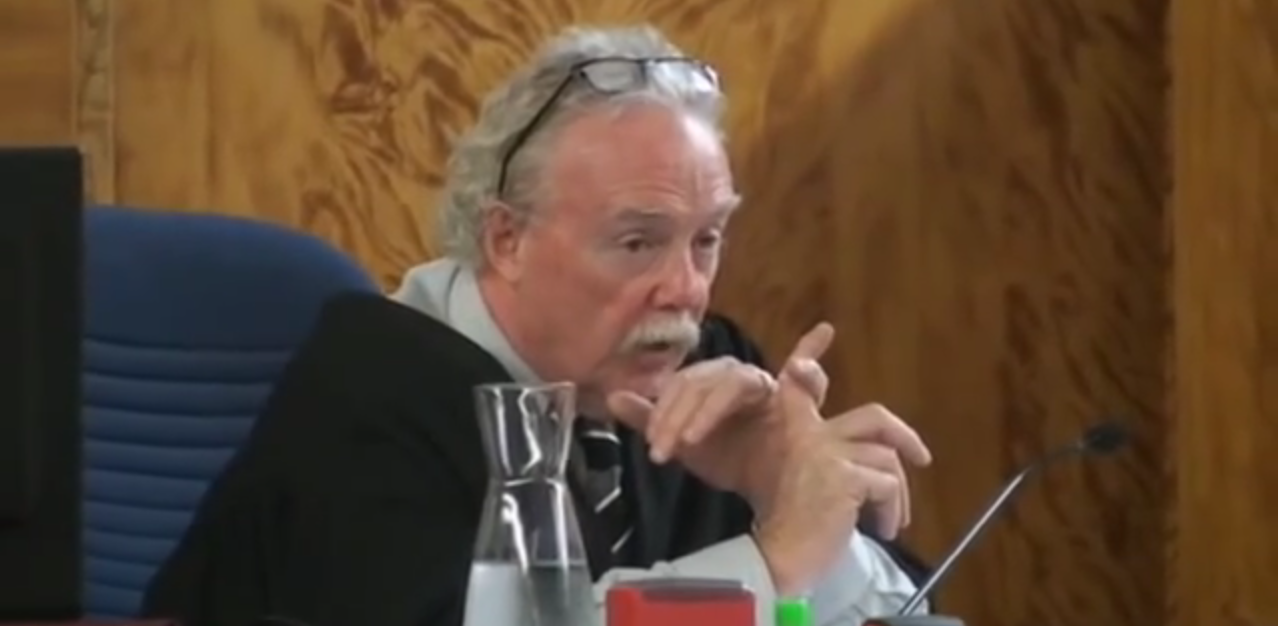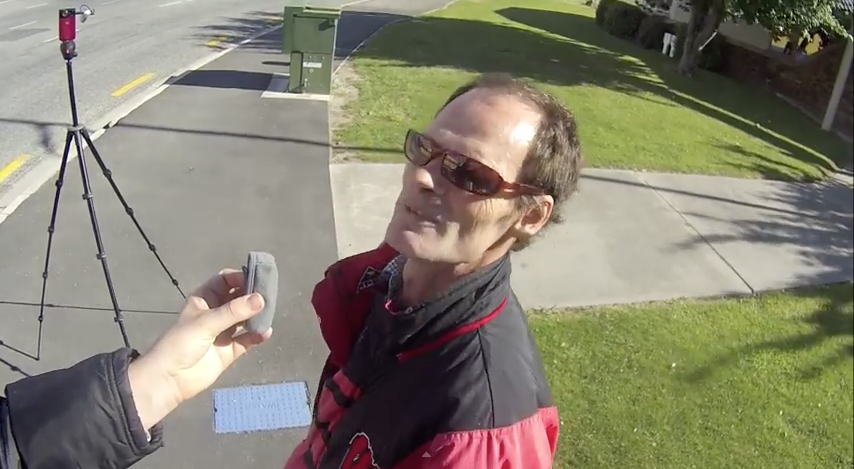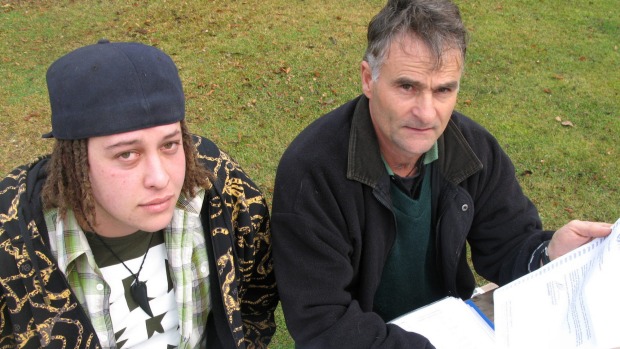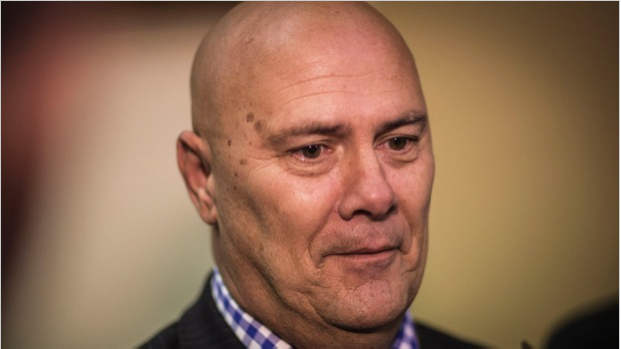
New Zealand District Court Judge Kevin Phillips, serious questions need to be asked, why did Phillips fail to recuse? There was after all a clear and present bias!
Back in mid 2012 an article appeared in the Herald on Sunday that should have raised a few eyebrows amongst Kiwi freedom of expression and free speech activists but didn’t. The fact that it didn’t cause a stir at the time may now prompt a little food for thought amongst those concerned with civil rights in New Zealand:
Colourful judge gets Facebooked
Sunday Jun 3, 2012
Authorities have asked Facebook to remove a hate page on which criminals abused a colourful New Zealand judge.
The social networking giant took down the site called “We hate Judge Kevin Phillips” after the Ministry of Justice deemed it a risk to his security.
The page was aimed at the hardline district court judge known for his often withering blasts at both lawyers and defendants from the bench.
The Facebook site featured expletive-riddled comments from some people claiming to having appeared before Phillips, a former defence lawyer who sits mainly at Invercargill and Queenstown. It led with the catchline: “We have all had him once, what a cunt.”
By the time Facebook took down the page last month, 218 people had “liked” it.
Comments included “stood in front of him today, cheers 4 bail you bundle haha” and “ha ha dislike him? Yes, we do”.
Another said “surely there’s more than 44 people that dislike him”. A reply to that from a Mere Fowler said “Yes thea is but half them in jail wea the wanker sent thm!”
However, one fan of Phillips offered a crumb of support, posting “When he was a lawyer he got me out of the shit a few times”.
– additional reporting by Paul Taylor of Mountain Scene
Source: NZ Herald On Sunday
The first concern this article raised is the ease with which New Zealand authorities were able to have a Facebook page arbitrarily pulled down. The excuse given, that it posed a risk to the safety of the judge whilst obviously complete bullshit, evidences beyond any doubt that the New Zealand Authorities already had the power to have material removed from the country’s social media platforms, and that they did use those powers, at least when it involved a disliked district court judge. That then raises the issue of the need for the new “harmful digital communications Act”. Obviously there was no need, as the police and department of justice could and had removed social media pages before as the above article proves.

Just how friendly with the local cops is Central Otago journalist Paul Taylor (Mountain Scene)? Was he in fact responsible for the ODT article, prefering not to be named?
However the article raises further questions that go beyond the political agenda of the government in their introduction of unessecary laws. On this occasion that article above raises the issue of the judicial competence and the integrity of New Zealand’s courts, in particular the country’s District Courts.
Late last month another article appeared online this time it was published by the Otago Daily Times, which also syndicates at the New Zealand Herald;
Man jailed for ‘blatant’ breach
Tue, 30 Jun 2015
A blatant, premeditated breach of suppression orders, including naming a former Central Otago policeman who had appeared in court, resulted in a three-month jail sentence for a Clyde man yesterday.
Christopher Wardill (46) had an ”intense dislike of the police” and went out of his way to treat the court orders with ”absolute contempt”, Judge Kevin Phillips said in the Alexandra District Court.
Wardill posted about the case on social media before going to court, and sat in the public gallery during the officer’s court appearance, so was aware of the suppression order and the reason for it, Judge Philips said.
Wardill then named the person on social media and linked the name with a court report published in the Otago Daily Times.
The ODT abided by the suppression order, the judge said.
Wardill repeated those breaches and carried on his blog postings ”as a kind of martyr”, the judge said.
In a second case of breaching orders, the suppressed name of a person who appeared in a North Island court had been published.
Wardill pleaded guilty to two charges of recklessly breaching suppression by publishing names on a social media site on December 12 at Alexandra and December 13 at Clyde.
Wardill was given a written warning about similar incidents in June last year and had been told the likely outcome if he breached suppression orders, Judge Phillips said.
Wardill collapsed in the dock during his sentencing yesterday, falling to the floor as Judge Phillips was highlighting the facts of the case.
The judge asked if Wardill wanted to be seated for the rest of the sentencing, but he declined and then interjected several times as Judge Phillips continued.
Counsel Noel Rayner said the web page Wardill posted on ”was not accessed by many – it’s not like it was printed in the ODT, which goes right through Otago”.
The information was up on his website for about two weeks.
It did not get many hits, Mr Rayner said.
As soon as police visited Wardill’s home, he took down the offending material and did not repeat the offending.
Other recent cases of breaching suppression had resulted in fines for the defendants and Wardill had abided by a deferred sentence in the past and said he would not offend again, so that might be an appropriate punishment, Mr Rayner said.
”The court process has been very stressful for him and his family.”
There was a ”psychiatric” background to the offending and the defendant’s ”vendetta” against the Alexandra police stemmed from an alleged assault, Mr Rayner said.
A prison sentence would be ”exceptionally hard” given the defendant’s general mental state.
The incidents were the ”top level” of seriousness, Judge Phillips said. Suppression orders sometimes related to the defendant or were imposed to protect the victims of crimes.
”Orders of the court will be respected by all … ,” Judge Phillips said. Wardill had to be held accountable, he said, sentencing the defendant to three months’ jail on each charge, the terms concurrent.
Source: Otago Daily Times
Note: No ODT journalist is attributed to the article, so was it Paul Taylors work. Or was it the work of police media spin doctors?
Of course regular readers will remember the name of the defendant in the above case, Chris Wardell who had admitted breaching a name suppression order in the case of Otago police officer John Clark, who stood charged with sex offences, namely the covert filming of a young girl whilst she had been showering.
Now the concern we here at LF have is the severity of the sentence that district court judge Kevin Phillips imposed. That concern is born of two arguments. The first of course was also raised by Wardills defence lawyer, Mr Raynor; that Wardill’s so-called webpage had not been viewed by many people and that as such the sentence should be a light one.
What raised our concerns also was the use of the term webpage or website, the simple fact is that Wardill did not have his own website. The alleged offending had occurred using a Facebook page, not just some random web page or website. So why did the Otago Daily Times reporter alter his description in favour of a non-descript term, when Facebook would have been far more appropriate and of course accurate.
We would suggest that the Otago Daily Times, their journalist (if in fact the story was even pened by a ODT journo), the court and police officials that had briefed the reporter were well aware of the existence of the earlier 2012 Facebook page that had targeted Judge Kevin Phillips specifically.
We are also 100% certain that Phillips himself would have been well aware of the fact that he had been publicly named and castigated using a Facebook page.
There is also little if any doubt that Judge Phillips would have had a rather large bone to pick over the use of Facebook in targeting him personally and his many errant decisions.

Central Otago man Chris Wardill, Judge Phillips person dislike got in the way of common sense and legal ethics
Moreover, Chris Wardill has to some extent been the bane of the Central Otago police for a number of years, Facebook being his preferred vehicle, as was to be expected following Wardill’s assault at the hands of two corrupt Central Otago Police officers.
The allegation that the entire Central Otago constabulary is bent has been raised in the past, not just by Wardill but also by the man who was behind the investigation into the conspiracy and perjury of Central Otago constabulary’s Senior Sergeant Neil Ford, the cop who had falsely accused central Otago teenager, Shane Cribb, of a crime he had not committed. The allegation being that Neil Ford had not acted alone in falsely accusing a young teenager in order to cover his own offending. That the police cover up went much further up the police food chain.
Of course in any event the bent cop Neil Ford ultimately went to jail four years later, but not before the massive attempted cover up by Otago police had been unravelled at considerable personal expense by Shane Cribb’s saviour, Mr Steve Potter.
Much of this story and these allegations were covered in a LF post published in January earlier this year; Are Central Otago Police concealing more corrupt officers and their criminal offending?
We here at LF have since done a little more digging and it seems to us that not only was Judge Kevin Phillips sentence well above that which should have been handed out but that it was likely that the sentence was in fact completely retaliatory.
The retaliation being payback for comments left on the Facebook page Otago locals had set up in Kevin Phillips honour back in June 2012. Of course this fact would also go a long way to explaining exactly why the Otago Daily Times journo decided not to mention Facebook, for fear that it might in turn lead to suspicion, the raising of the very ugly question of actual bias.

Shane Cribb with Steve Potter. Potter battled for years to get justice, with the might of a corrupt police force standing in the way
In LFs opinion District Court Judge Kevin Phillips should most certainly not have heard this case, nor should he have been permitted to pass sentence. In short Judge Phillips should have recused himself. The fact that Phillips didn’t recuse despite what we would argue was a real and present bias, a very serious conflict, that is of extreme concern, especially given the nature of the harsh sentence.
Even if you were to accept that there was a real danger of percieved bias only, then Phillips was bound by ethics and precedent to have immediately recused himself, but again he did not.
This then raises questions about the competence or otherwise of Chris Wardill’s defence lawyer. Why was Mr Raynor not abreast of Judge Phillips attitude towards Facebook and in particular past comments left on certain Facebook pages by Chris Wardill, why didn’t Raynor raise this fact at the time and demand the judge recuse himself?
We would suggest that someone attend the prison and advise Mr Wardill that he should instruct an honest lawyer to file an appeal immediately, Wardill should never have been given a custodial sentence, it simply was not inline with the severity of the offending and or the sentences handed out to others including ex National party MP Tau Henare, who famously named Graeme Thorne using social media platform Twitter only a month or so before and recieved a slap on the wrist by comparison.
As an aside, Judge Phillips has a long history of seriously questionable judgements, amongst them his dealing with the sentencing of fellow District Court Judge Mary Beth Sharp, nee Willis. All rather suspect by anyones standard.
Of course here at LF we’ve also run a number of stories on Judge Sharp, in particular her inexplicable decisions around SFO lawyer Anita Killeen’s behaviour; Secret Women’s Business and the SFO Forger Anita Killeen. LF was not alone in its criticism of Kevin Phillips behaviour at the sentencing of his fellow judge. The Whale Oil blog amongst various others also questioned Kevin Phillips judgement in a post – THIS ISN’T RIGHT
Judge must pay $500 to woman hurt by dog
Thursday May 9, 2013
A District Court judge who was walking her son’s dog when it injured a woman has been discharged without conviction and ordered to pay $500 compensation to the victim.
Judge Mary Beth Sharp yesterday pleaded guilty in Auckland District Court to being in possession of a dog that startled a person, causing injury, after the Auckland Council withdrew a more serious charge of owning a dog that attacked a person, which she denied.
Sharp did not appear in person.
The court was told that Sharp, who is named on the court record as Mary-Elizabeth Willis, was walking her son’s boxer dog, George, near her home in Papakura on the morning of February 10 last year.
Margot Bryant was also going for a walk and the two were talking when George jumped up and injured Mrs Bryant’s right forearm.
“Day to day it wasn’t easy,” Mrs Bryant said in court.
“I’d hate it to happen to anyone else. I have two grandchildren, the love of my life. I’d hate it if anything happened to them,” she said.
The court was told the dog was on a leash and quickly restrained, and Sharp’s lawyer, Michael Reed, QC, said it was accidental.
“There was no intent. It wasn’t even her dog.”
Sharp and her family had behaved “impeccably” towards the victim, offering financial assistance, even baking her a cake, Mr Reed said.
The dog had gone to a “dog guru expert” for treatment, and no longer jumped so it was not necessary for it to be destroyed.
Judge Kevin Phillips granted a discharge without conviction on the grounds that, in order of importance:
• Auckland Council supported the application.
• The dog was under control at the time of the incident and immediately restrained.
• Sharp had an unblemished record.
• A conviction would adversely impact on her job as a judge.“It is quite clear that the consequences [of a conviction] are out of all proportion to the gravity of the offending,” Judge Phillips said.
The dog was “well trained and extremely well socialised” and he did not order it to be destroyed.
Mr Reed said outside court that Sharp did not appear before Judge Phillips because it was not necessary unless there was a chance of imprisonment.
“There’s nothing unusual about that at all,” he said. “She’s busy working.”
Source: The New Zealand Herald
Further Reading:
Q&A with Judge Kevin Phillips
Judge Phillips took up practice in Queenstown in 1984. His background was primarily in litigation. There were no specialist litigation lawyers in Queenstown when he first arrived. Queenstown Court sat one day a month with only Criminal jurisdiction. Civil and family cases were heard in Alexandra. The visiting judges were from Invercargill. He has sat regularly in Queenstown since 2006.
How would you describe the Queenstown-Lakes District legal profession?
The Queenstown legal profession has changed and grown dramatically, but it still has the sole practitioners who cover the whole spectrum of legal advice and who are still prepared to attend and appear in the Queenstown Court for impecunious litigants and who receive only the ridiculously low legal aid fees.
There are common law specialists who, although few in number, deal with a growing amount of serious crime, particularly of a violent kind. There are the environmental law specialists and civil litigators who have practices covering New Zealand rather than just the Queenstown Basin.
As a whole, the Queenstown legal profession is high-end professional, diligent, honest and there is strong collegiality.
What are some of the legal issues unique to Queenstown?
Legal issues brought about by periods of strong growth, where there is enormous pressure placed on legal firms to get the work done with ever increasing rents and staffing costs which are followed by sudden and sharp recessions. This places further demands where work is falling and staff numbers have to be decreased. It is the suddenness and nature of such changes that is the problem and the uniqueness.
There can be difficulties in getting the right staff to take up positions because of this – further complicated by the cost of living in Central Otago, particularly housing.
The transient nature of a lot of the population and tourists brings difficulties to the legal profession. Such clients are notoriously fickle, changing lawyers and their requirements /instructions.
Clients also suffer the up and down nature of the economy and can quickly come under pressure both financially and relationship wise. This can place strain on the lawyers assisting who need to be able to respond immediately.
I always thought practising in Queenstown was akin to practising in the bigger cities, but without the travel difficulties and with many other bonuses.
Source: New Zealand Law Society

Comments are closed here.